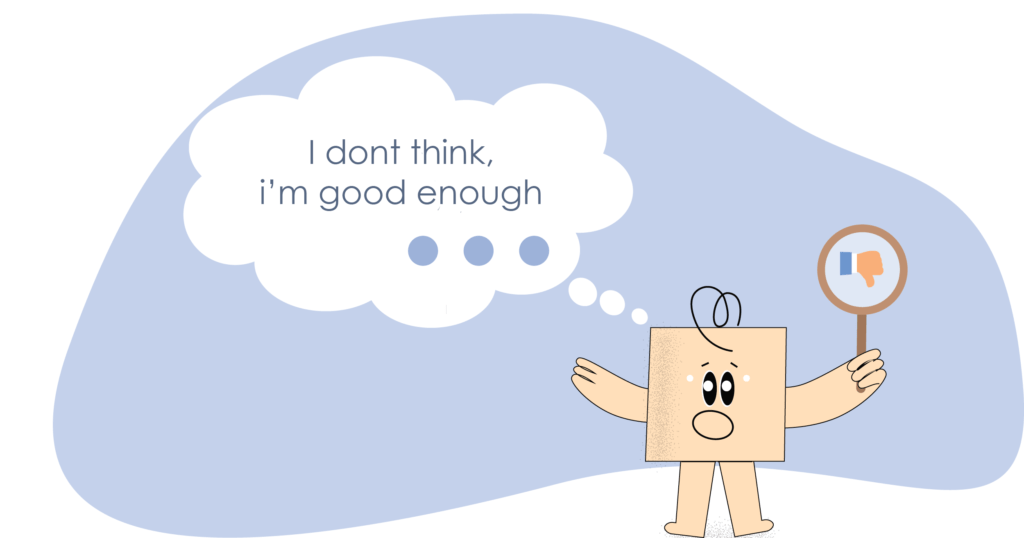“I don’t feel like I deserve to be here; I just feel I was at the right place, at the right time and luck played a major role. I don’t think I fit in because of my efforts, and rather I feel I fit in because people don’t realize that I might not be good at certain things. I feel like an imposter!”
Have you ever heard someone say this to you? Or have you been someone who said this to people around you?
In this blog, we will look forward to the following key pointers :
- What is Imposter syndrome?
- Causes of it.
- Symptoms of Imposter syndrome in everyday life.
- Different types of Imposters.
- How to deal with Imposters syndrome?
The term, Imposter Syndrome, was coined by two psychologists, Drs. Clance and Imes, in the late 1970s. In recent years, the term “imposter syndrome” has become familiar to many of us because of its effect on our professional, personal and social lives. “Am I promoted because I deserve it or because I am here? Am I invited to the party because they like me or do they pity me? Why does he/she love me? Am I even good for them?”
Many such questions don’t just affect how we look at ourselves, but they affect the way we react to the world around us. The reason we need to understand why Imposter syndrome is real is because of the growth it hinders for an individual.
While one keeps thinking and judging their potential, most of their time goes into proving how they are not worthy enough instead of using that opportunity or any circumstance for growth.
Seema is a girl who is passionate about teaching, and she has been a teacher for the past two years. Recently Seema has developed this Imposter syndrome where she constantly questions whether she is a really good teacher or just nice for the kids to like her.
With this constant tussle of whether I am good at what I do, Seema no more can focus on doing better. In this continuous tussle of proving herself certain things, she loses the love she has for the job, she starts getting anxious about going to work, and she questions her entire existence.
Merriam-Webster defines imposter syndrome, in part, as “persistent doubt concerning one’s abilities or accomplishments accompanied by the fear of being exposed as a fraud despite evidence of one’s ongoing success. Imposter syndrome started being widely known in the 1970s in the United States, where two psychologists(Clance & Imes) discovered it most generally in high-achieving professional women.
Around 1978, they began noticing that women in high-achieving roles suffered self-doubt, incompetence, and fear of not achieving better in the future than their male companions. Over a few years, it was clear that Imposter syndrome is not confined to just females; it is a universal phenomenon.
Why does this Syndrome arise in the first place? Let us look at the various perspectives here.
Why does this Syndrome arise in the first place?
Psychological
- The parenting you experience as a child has an immense contribution to how you view success and failure. When you have witnessed authoritarian parenting, chances are that you were rewarded for your achievements, not your efforts as a child. This makes the adult in you constantly strive for more and not look at what you have been able to achieve already.
- A lot of personalization is attached to failures in life due to the neurotic need to be in control of everything in life.
- When one’s identity comes from a lot of what they do rather than who they are. This makes a person extremely anxious to constantly maintain that identity as there is a fear of what if this goes away.
Behavioural
- If one has seen a parent being extremely ambitious or a workaholic, a child might internalize this feeling of being good enough only if they can perform.
- If, as a child or an adult, we have been validated for the things we do rather than who we are, it is human to not believe in who we are as a person but always to strive to be the best to be liked.
Social
- Certain gender stereotypes, for, eg. A man is a good leader, unconsciously would lead a woman in a higher position to question whether she is a good fit and whether she deserves to be there. Women like Michelle Obama and Sheryl Sandberg have talked about how they had their journeys with imposter syndrome as women in terms of authoritative figures.
- If the society that a person comes from might favour the ideal version of the people over how real they are, there can be a great divide that a man can keep on trying to fulfil.
Symptoms of Imposter Syndrome

- “I don’t think I will ever be able to achieve that” (the notion of impossible success).
- “I don’t think I am good enough. I could have done better.” (Constant tussle).
- “I don’t think he/she will approve of me and my work.” (feeling incompetent when it comes to other people’s expectations.)
- “I think I was at the right place and time.” (Success is dedicated to luck rather than work.)
- “Okay, I could do that then, but I don’t think I can be good every time.” (Judging one’s abilities now and then.)
- “Oh, well, thanks for praising me, but I don’t think I deserve it.” (Not able to take credit or compliments.)
- “Yes, I did that, but why didn’t I do better?” (Lack of regard for current accomplishments.)
- “What if I’m never good enough.” (Feeling of inadequacy.)
Types of Imposters
1. The perfectionist
Monica from the sitcom F.R.I.E.N.D.S or Amir Khan (as we all call him the perfectionist) are people who need to be perfect. This does not mean we should not give our best, but there is a difference between giving your best and giving the best. Perfectionists strive for the best. Giving “your best” is in your control; giving “the best” might not always be.

And while this seldom helps, also sometimes it doesn’t. Sometimes doing better also helps. But when there is an extreme need for perfection in work, even doing your good can feel like being an imposter.
2. The super-hero
“I want to multitask!” Well, that sounds good and humanly possible. “I want to multitask and be the best at everything I do!” Well, here, maybe we have a problem. The problem is not wanting to be good at everything, and the issue is the need to be perfect at everything.
Because, as a human being, there are days when you are not at your best. Where you might not be able to do justice to every task at hand, for you and me, it would be okay as it’s just a matter of the day. But for someone with imposter syndrome, this would mean a huge failure on their part.
3. Experts
When we are called experts in what we do, we feel a sense of pride because that means we know a lot. But to maintain that expertise means I have to keep on learning and learning constantly. Many of us learn not to have expertise as a primary goal.
But with someone with imposter syndrome, learning can be a source of expertise, and expertise gives rise to a constant anxious urge to learn to maintain that position of authority.
4. The natural genius
“Well, If I am taking so much time at this, I must be really stupid!” A natural genius sees the world as either black or white. They judge themselves for not being competent as they believe they should have been.
5. The Soloist
“If I need his/her help, then I’m so hugely incompetent!” While others see help as a part of learning, a soloist would see it as a threat to their competency. They believe in doing everything by themselves and in being highly independent, which seldom makes the tasks more difficult, thus increasing the imposter syndrome.
How to deal with Imposter Syndrome?
1. Be kind
Being kind to yourself as a human being is very important, not because you need it but because you deserve it, irrespective of your wins and losses.
2. Challenge your thoughts

Let us take an example of how challenging helps.
Imposter thought: “Am I good enough?”
Challenging thought: “What if you aren’t good enough?”
Imposter thought: “Then I think I should be good enough!”
Challenging thought: “Is it coming from the need to improve oneself or the fear of incompetence?”
Imposter thought: “I feel I don’t deserve the things I have today!”
Challenging thought: “Why does it matter so much to feel deserving of a position or place every day?”
Imposter thought: “I feel like I am an imposter!”
Challenging thought: “Maybe we are just humans who have been told to be constantly worthy by being more and were never accepted for who we are.”
3. Clear those facts
When you question whether you deserve something in your life and would partly also hold luck as a major factor, writing down your strengths and weaknesses helps you to know better about why you are at the place you are at. It helps you realize that it’s okay to have your weaknesses but what matters is also those strengths that define you.
4. Change and Acceptance
No matter which environment we have been brought up in, we, as children and as adults, are different. As a child, our worth depended on how our parents or other people around us treated us. As adults, we get to decide that.
We have the freedom to make new definitions that work for us. If we learn to constantly work hard to seek validation, as adults, we can challenge the notion of validation by not seeking it for doing but for being.
5. Identity
“Who are you?” Many times the answer to this question would start as I am a psychologist, I am a doctor, I am a father, I am a mother, etc. But apart from all these roles that we play, who are we? Yes, we are our work, we are our family, but we aren’t ONLY our work or only our family. Understanding who you are gives a sense of identity that helps when everything else seems in question.
To sum it up, Imposter Syndrome is real and does affect our lives in extremities we might not be aware of. Seeking help at the right time is the first step you can take for yourself or your loved ones.
“What world would you live in if you constantly questioned yourself whether you fit in?”
Read More:
Mental Health Effects of Screen Time: Impact of Excessive Screen Time on Mental Health
Understanding Somatic Symptoms and Related Disorders
Trauma: Types, Causes, Symptoms and Major Disorders of Trauma





